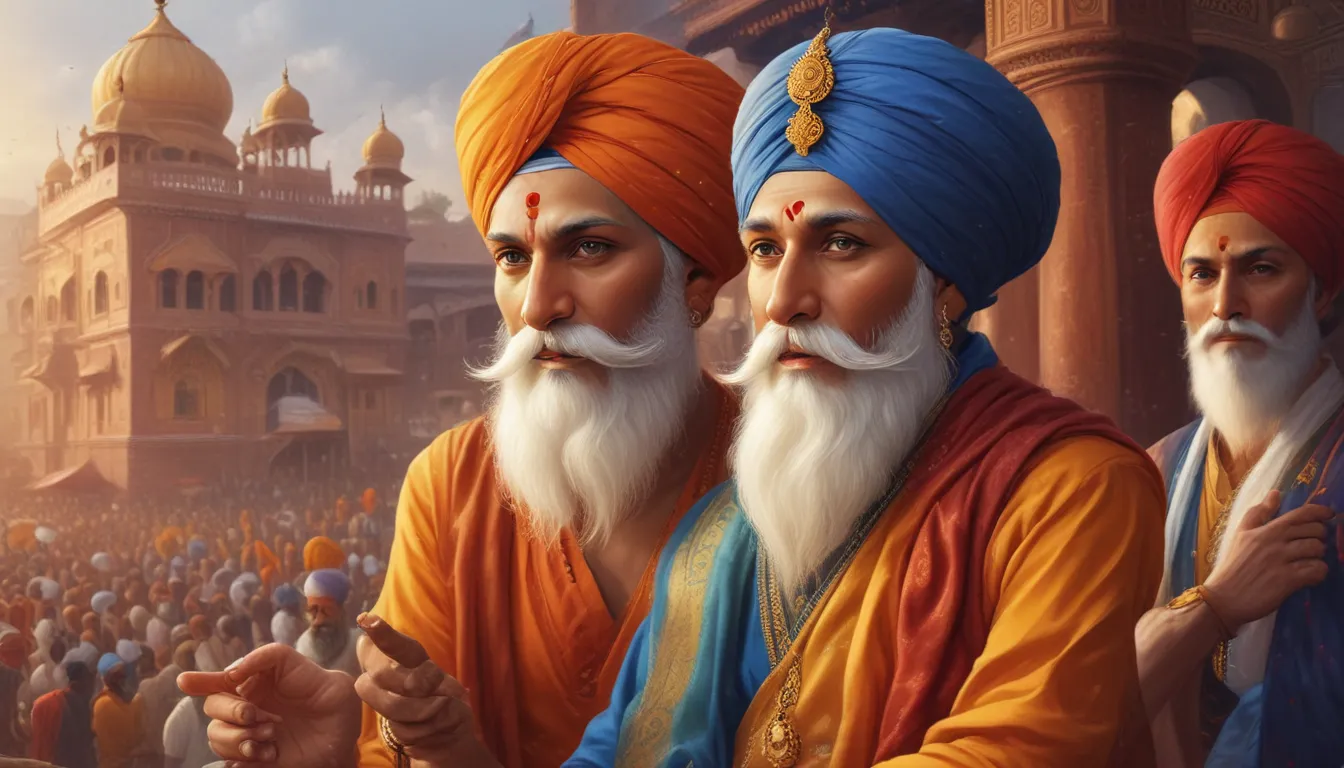The images in our articles may not match the content exactly. They are used to grab your attention, not to show the exact details in the text. The images complement the text but do not replace it.
Welcome to a journey of discovery into the vibrant and influential world of Sikhism. With its origins rooted in the Punjab region of India in the 15th century, Sikhism has blossomed into a major religion with over 25 million followers globally. This faith is not just a set of beliefs but a way of life that revolves around principles of equality, community service, and devotion to the divine. If you are intrigued by Sikhism or eager to understand more about this transformative religion, then buckle up as we delve into 20 captivating facts that shed light on the essence of Sikhism.
Unveiling the Origins of Sikhism
In the late 15th century, the seeds of Sikhism were sown by Guru Nanak Dev Ji in the Punjab region of South Asia. This makes Sikhism one of the youngest major religions in the world. The core principles of Sikhism stem from the teachings of Guru Nanak Dev Ji, emphasizing oneness with God, equality, and unity.
Discovering the Guru Granth Sahib
At the heart of Sikhism lies the Guru Granth Sahib, the central scripture revered by Sikhs. This sacred text is considered the eternal Guru, embodying the teachings of the ten Sikh Gurus and selected saints. The Guru Granth Sahib serves as a guiding light for Sikhs in their spiritual journey.
Embracing Belief in One God
Sikhism stands as a beacon of monotheism, with a strong emphasis on the belief in one God known as Ik Onkar. The foundation of Sikhism is built upon the unity and equality of all living beings, fostering a sense of oneness and interconnectedness.
Immersing in the Five Ks
The Five Ks serve as symbolic articles of faith that practicing Sikhs adorn as a representation of their identity. From Kesh (uncut hair) to Kirpan (ceremonial dagger), each of the Five Ks holds deep spiritual significance, reminding Sikhs of their commitment to their faith and values.
Nurturing Spiritual Connection through Seva
Sewa, meaning selfless service, is a cornerstone of Sikhism that underscores the importance of serving others with kindness and compassion. Through acts of charity and community service, Sikhs embody the essence of empathy and generosity, transcending barriers of caste, race, or social status.
A Sanctuary of Equality and Social Justice
At the core of Sikhism lies a profound commitment to equality and social justice. The concept of Langar epitomizes this belief, as individuals from all walks of life gather together to share a meal, symbolizing the essence of equality and unity within the Sikh community.
The Emblematic Sikh Turban
The Sikh turban, also known as a dastaar or pagri, holds significant cultural and spiritual relevance for Sikhs. Beyond serving as a symbol of honor and discipline, the turban embodies the values of spirituality and self-respect that are intrinsic to Sikh identity.
Initiating the Amrit Ceremony
The Amrit ceremony, or Amrit Sanchar, marks the initiation of individuals into the Khalsa, or the community of baptized Sikhs. Through the consumption of Amrit, a sweetened water stirred with a double-edged sword, individuals pledge their allegiance to the Sikh faith and its values.
Revering the Golden Temple
The Golden Temple, also known as Harmandir Sahib, stands as the holiest Gurdwara and a major spiritual center for Sikhs worldwide. Nestled in Amritsar, India, this architectural marvel attracts millions of devotees and visitors, symbolizing the sanctity and grandeur of Sikhism.
Embracing the Five Virtues
The Five Virtues, known as the Panj Pyare, embody the qualities instilled in the first five individuals initiated into the Khalsa by Guru Gobind Singh. From bravery to compassion, these virtues serve as guiding principles for Sikhs in their pursuit of righteousness and moral integrity.
Cultivating Spiritual Practices: Simran and Naam Japna
Central to Sikh spirituality are practices like Simran, meditation on the divine, and Naam Japna, reciting the divine name. These practices enable Sikhs to forge a deep spiritual connection with the divine, fostering inner peace and enlightenment.
Honoring the Legacy of Guru Tegh Bahadur
Guru Tegh Bahadur, the ninth Guru of Sikhism, epitomizes sacrifice and courage through his martyrdom to protect the religious freedom of Hindus during the Mughal Empire’s reign. His selfless act serves as a poignant reminder of the principles of justice and religious tolerance upheld in Sikhism.
Navigating the Three Pillars of Sikhism
Sikhism rests on three foundational principles: Naam Japna, Kirat Karni, and Vand Chakna. These pillars emphasize the importance of remembering God, earning an honest living, and sharing with others, guiding Sikhs in leading a virtuous and purposeful life.
Celebrating Vaisakhi: A Festival of Significance
Vaisakhi holds special importance in Sikhism, commemorating the formation of the Khalsa in 1699. This vibrant festival is marked with fervor and enthusiasm by Sikhs worldwide, reflecting the spirit of unity, renewal, and community celebration.
Reveling in the Recitation of Gurbani
Gurbani, the sacred hymns and verses from the Guru Granth Sahib, holds profound spiritual significance for Sikhs. Engaging in the recitation of Gurbani allows Sikhs to immerse themselves in divine wisdom and seek spiritual solace.
Embracing Sehaj Path: A Spiritual Journey
Sehaj Path entails the uninterrupted reading of the entire Guru Granth Sahib, spanning several days to complete. This spiritual practice holds immense reverence among Sikhs, offering a transformative journey of spiritual growth and enlightenment.
Embodying Miri-Piri: Balancing the Temporal and Spiritual Realms
Miri-Piri symbolizes the harmonious balance of temporal and spiritual aspects in the life of a Sikh. By upholding their religious beliefs while engaging with the world, Sikhs strive to lead a balanced and purposeful existence.
Upholding Universal Humanitarianism
Sikhism champions universal humanitarianism, inspiring its followers to engage in acts of charity and service to those in need, transcending religious and cultural boundaries. Through their altruistic endeavors, Sikhs embody the essence of compassion and benevolence.
Reflecting on Guru Nanak Dev Ji’s Teachings
Guru Nanak Dev Ji’s teachings resonate through the core principles of Sikhism, underscoring the significance of selfless service, equality, and devotion to God. His timeless wisdom forms the bedrock of Sikh spirituality and guides followers in leading a life of purpose and integrity.
Conclusion: A Tapestry of Sikhism
In conclusion, Sikhism emerges as a tapestry woven with rich traditions, profound beliefs, and inclusive values. From its humble origins to its global presence, Sikhism stands as a testament to the enduring spirit of unity, equality, and devotion. As Sikhs continue to uphold the core tenets of their faith through practices like the Five Ks, Seva, and spiritual meditation, they embody the essence of Sikhism in their everyday lives.
FAQs: Navigating Common Queries
- What does the term “Sikh” signify?
-
The term “Sikh” denotes a learner or disciple who follows the teachings of the Sikh Gurus.
-
How many Sikhs exist globally?
-
There are approximately 30 million Sikhs worldwide, constituting the fifth-largest organized religion globally.
-
What are the fundamental beliefs of Sikhism?
-
Sikhism emphasizes belief in one God, equality among all human beings, and the significance of selfless service and devotion.
-
Are women regarded as equals in Sikhism?
-
Yes, Sikhism upholds the equality of men and women, with women playing pivotal roles throughout Sikh history.
-
Why is the turban important in Sikhism?
-
The Sikh turban symbolizes self-respect, spirituality, and equality, portraying a deep commitment to Sikh values.
-
How do Sikhs practice their faith?
-
Sikhs practice their faith through daily prayers, meditation, reading and recitation of the Guru Granth Sahib, and engaging in community service.
-
Can Sikhs marry individuals outside their faith?
-
Sikhs are permitted to marry individuals outside their faith, though it is preferable to wed someone who shares similar beliefs and values.
-
What is the significance of the langar in Sikhism?
-
The langar, a communal kitchen offering free meals to all individuals, underscores the principles of equality and charity within Sikhism.
-
Do Sikhs adhere to the doctrine of reincarnation?
-
Yes, Sikhs believe in reincarnation and strive to break the cycle of birth and death to merge with God.
-
Which festivals are celebrated in Sikhism?
- Sikhism observes various festivals, including Guru Nanak Gurpurab, Vaisakhi, and Diwali, commemorating the teachings of the Sikh Gurus and significant events in Sikh history.
Unveiling the multifaceted tapestry of Sikhism, these 20 enthralling facts provide a glimpse into the profound teachings, timeless traditions, and inclusive values that define this remarkable faith. As you embark on this journey of discovery, may you gain a deeper appreciation for Sikhism’s enduring legacy and its unwavering commitment to unity, equality, and spiritual enlightenment.






